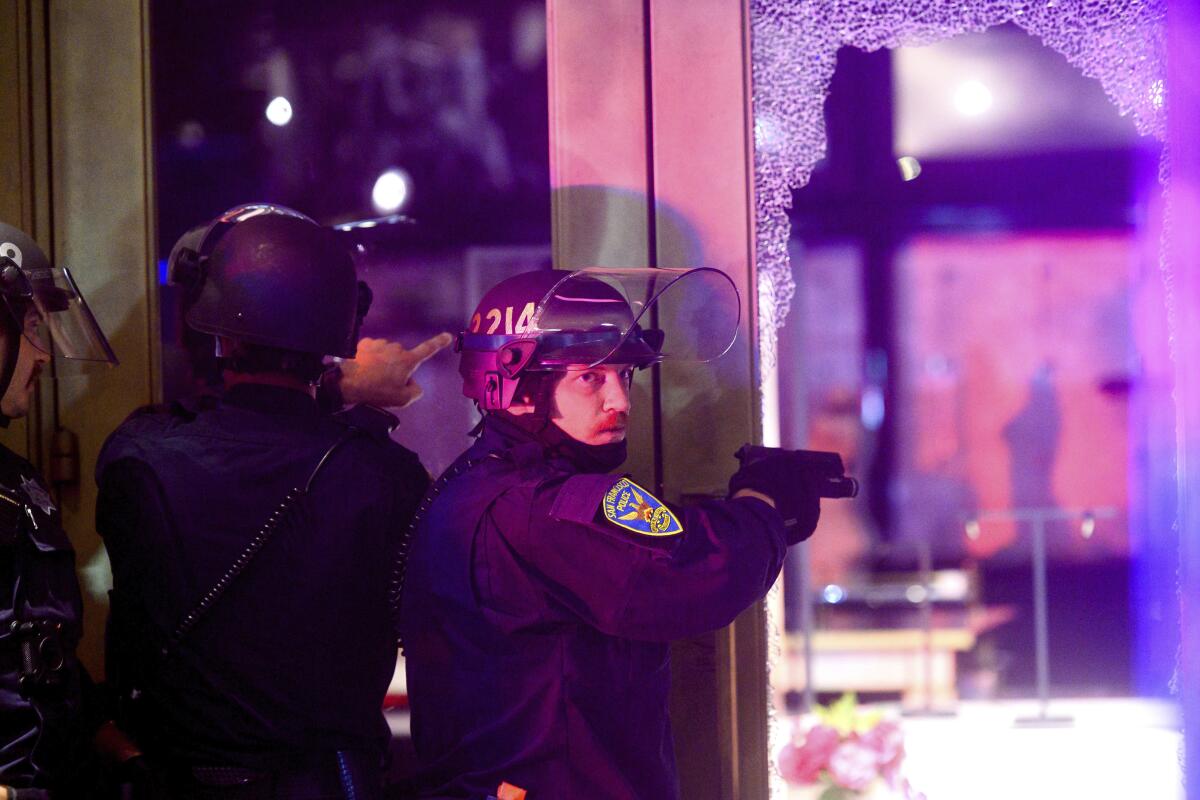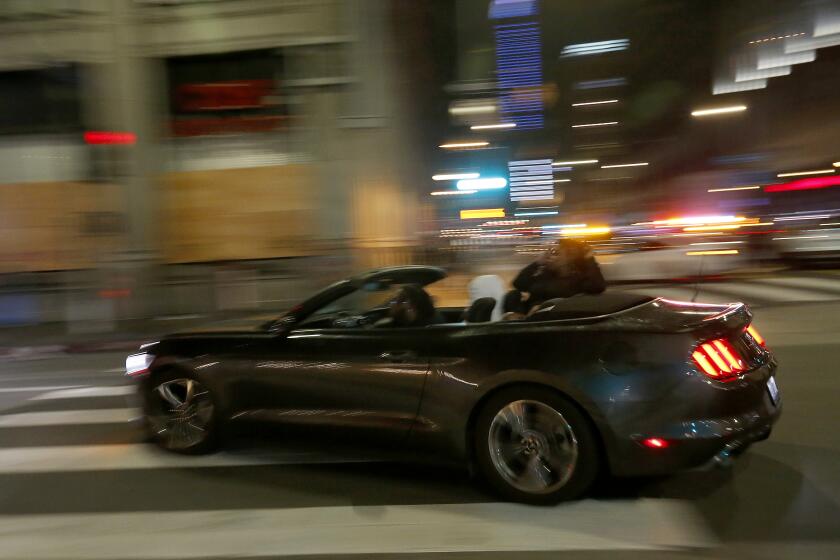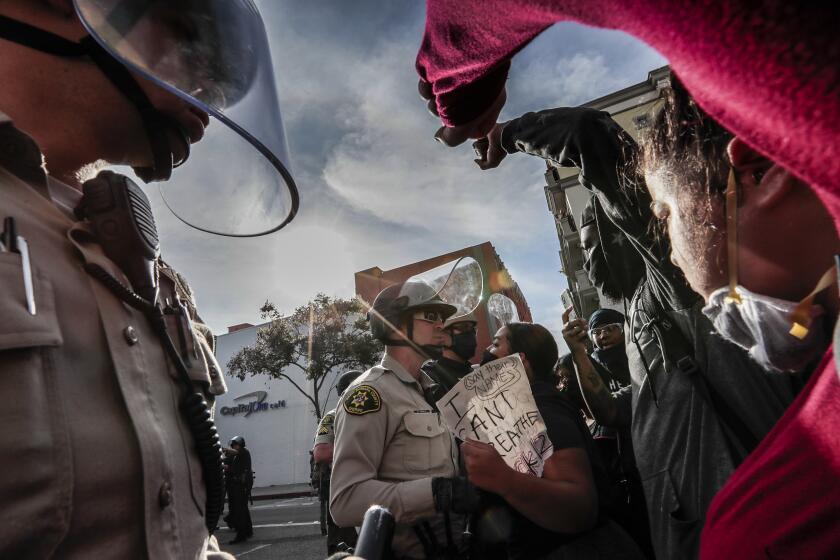Protests in Northern California are marked by frustration and pockets of violence

- Share via
SACRAMENTO — Thousands of demonstrators in cities across Northern California once again took to the streets Saturday night, even as the National Guard was called in to quell unrest in Los Angeles. Although those troops were not deployed in other California cities, violence escalated late into the night in many communities, prompting curfews and pleas from local leaders that largely went unheeded.
“We’ve always said this is a national problem and a national concern for people of color,” said Berry Accius, a civil rights activist who is participating in Sacramento protests. “Everybody — black, white, Asian, Mexican — people who are on the side of right have had too much talking. ... Everything is cause and effect. What did you think was going to happen?”
In Oakland, fires burned for a second night and video showed looters inside a 7-11 and other retail stores, many in the downtown area where only hours earlier shopkeepers had begun cleaning up from the night before.
Oakland Mayor Libby Schaaf said earlier Saturday that protesters’ rage “had crossed an unacceptable line” after the city was devastated Friday night by widespread looting and multiple fires. A contract federal security agent outside a U.S. courthouse was shot and killed and another was wounded Friday night, an incident authorities are calling domestic terrorism.
In San Francisco, protesters gathered late in the night in front of Mayor London Breed’s home, shooting fireworks and chanting her name.
Though the demonstrations in that city had largely been peaceful throughout the day, in the early evening, protesters broke the windows of a popular mall on Market Street. Hours later, protesters blocked an entrance to the 101 Freeway before being pushed away by police.
San Francisco orders curfews, asks to have National Guard on standby after looting
Breed on Saturday night ordered a curfew to go into effect at 8 p.m. Sunday and last until 5 a.m. Monday. Healthcare workers and public safety employees are exempted from the curfew.
“Until we see that the situation is under control, we will allow the curfew to remain,” Breed said at a news conference Sunday. “We, again, welcome peaceful protest, but we will not tolerate violence and crime.”
There were 10 felony arrests on suspicion of looting in the city, San Francisco Police Chief Bill Scott said Sunday morning.
California authorities have agreed to send around 200 additional law enforcement personnel to San Francisco to keep the city safe, Scott said. It wasn’t immediately clear which agencies would be providing those resources.
Firefighters responded to dozens of fires that were intentionally set across the city on the street, in businesses and in vehicles, San Francisco Fire Chief Jeanine Nicholson said. In addition, there were 250 medical calls, many a result of violence, she said.
The L.A. County curfew was put in place after looting and arson amid peaceful George Floyd protests. The National Guard and police officers were out.
In Sacramento, more than 1,000 people gathered at the state Capitol early in the day, where some lobbed water bottles and other items at law enforcement. Later, they moved to the nearby county jail and smashed windows on a set of doors into the lobby. After the sun set, protesters returned to the jail and confronted police, who fired “flash bang” noise-making devices and non-lethal weapons at the crowd, injuring at least one protester, according to video posted of the incident.
Protesters also broke into a nearby Macy’s department store and other retail outlets and looted them.
“Destruction is the opposite of righteous protest. Sacramento’s small businesses did not cause our nation’s anguish,” said Sacramento Mayor Darrell Steinberg in a statement. “What we are witnessing tonight is not what Sacramento stands for.”
In all three cities, protesters chanted the name of George Floyd, the black man who died last week in Minneapolis after a white officer pinned him to the ground by putting his knee on Floyd’s neck. Chants — and graffiti — of “I can’t breathe” also marked the events, reminders of Floyd’s last words.
In San Jose, San Francisco and Oakland, police unions representing rank-and-file officers on Thursday issued statements condemning both the officer who knelt on Floyd’s neck as well as the three others who participated in the arrest and did not intervene to help Floyd. And in Santa Cruz, a social media post showed its police chief and mayor taking a knee with protesters, a reference both to the way Floyd was pinned down and the long-running civil rights movement sparked by quarterback Colin Kaepernick and meant to drive attention toward disparities in policing of communities of color.
“It’s a recognition that not speaking out on incidents such as this was and is a mistake,” Tom Saggau, spokesman for police unions in San Jose and San Francisco, said Friday.
But the unusual acts of solidarity from law enforcement did little to stem anger toward them.
Floyd’s name was joined by a list of other men and women of color whom demonstrators said had been killed by local authorities, representing a larger issue. Protesters said it was the ongoing systemic racism among law enforcement that ultimately brought them out.
In Sacramento, Stephon Clark’s name was taken up by crowds more than once. Clark, a black man, was killed by Sacramento police in 2018 after they mistook his cellphone for a gun after chasing him into his grandmother’s backyard. Clark’s brother, Stevante Clark, was among those protesting in Sacramento over the weekend.
The Clark shooting also led to massive, though mostly peaceful, protests that contributed last year to the passage of a new use-of-force standard in California, which says police may use deadly force when “necessary,” rather than when it is “reasonable.” That law went into effect in January.
“This is not a local issue,” Clark said on social media Saturday. “We as a nation are feeling the effects of police brutality.”
Times staff writer Rong-Gong Lin II contributed to this report.
More to Read
Sign up for Essential California
The most important California stories and recommendations in your inbox every morning.
You may occasionally receive promotional content from the Los Angeles Times.
















